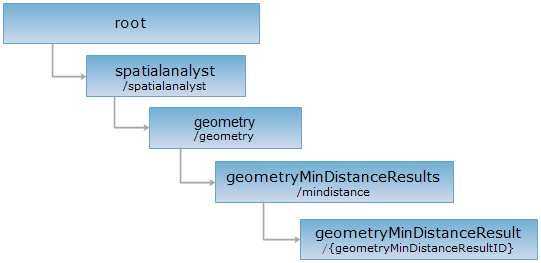
<geometryMinDistanceResults_uri>/mindistance[.<format>]
The result resource for calculating min distance for geometry.
Supported Methods:
Supported output formats: rjson, json, html, xml.

Implement the HTTP request on the following URI, where supermapiserver is the server name, with rjson being the output format.
http://supermapiserver:8090/iserver/services/spatialanalyst-sample/restjsr/spatialanalyst/geometry/mindistance/1.rjson
Gets the datasetMinDistanceResult resource.
The response structure will be as follows after implementing the GET request:
| Field | Type | Description |
| datasetName | String | The name of the result dataset. It is used to represent the result dataset with datasourceName. null indicates no result dataset has been returned during analysis. |
| datasourceName | String | The name of the datasource to which the result dataset belongs. null indicates no result dataset has been returned during analysis. |
| distanceResults | DistanceResult | The detailed information of the calculated result. While result dataset is returned, the result informaiton is stored in the result dataset and the value of distanceResults is null. |
The returned rjosn format result after implementing the GET request on the result resource http://supermapiserver:8090/iserver/services/spatialanalyst-sample/restjsr/spatialanalyst/geometry/mindistance/mvrpzwln_f5a166e50b6a4400adb6f2e836b664b1 of the POST request on geometryMinDistanceResults .rjson is as follows:
{
"datasetName": null,
"datasourceName": null,
"distanceResults": [
{
"distance": 1941565.658677927,
"referenceGeometryIDs": [465],
"sourceGeometryID": 1
},
{
"distance": 1941549.5697663200,
"referenceGeometryIDs": [465],
"sourceGeometryID": 2
}
]
}
Asks for the response identical to the one that would correspond to a GET request, but without the response body. This is useful for retrieving meta-information written in response headers, without having to transport the entire content. The meta-information includes the media-type, content-encoding, transfer-encoding, content-length, etc.
HEAD request can be used to check if the geometryMinDistanceResult resource exists, or if the geometryMinDistanceResult resource can be accessed by clients. It can also determine if the geometryMinDistanceResult resource supports an output format <format> if performed on a URI with .<format> included.